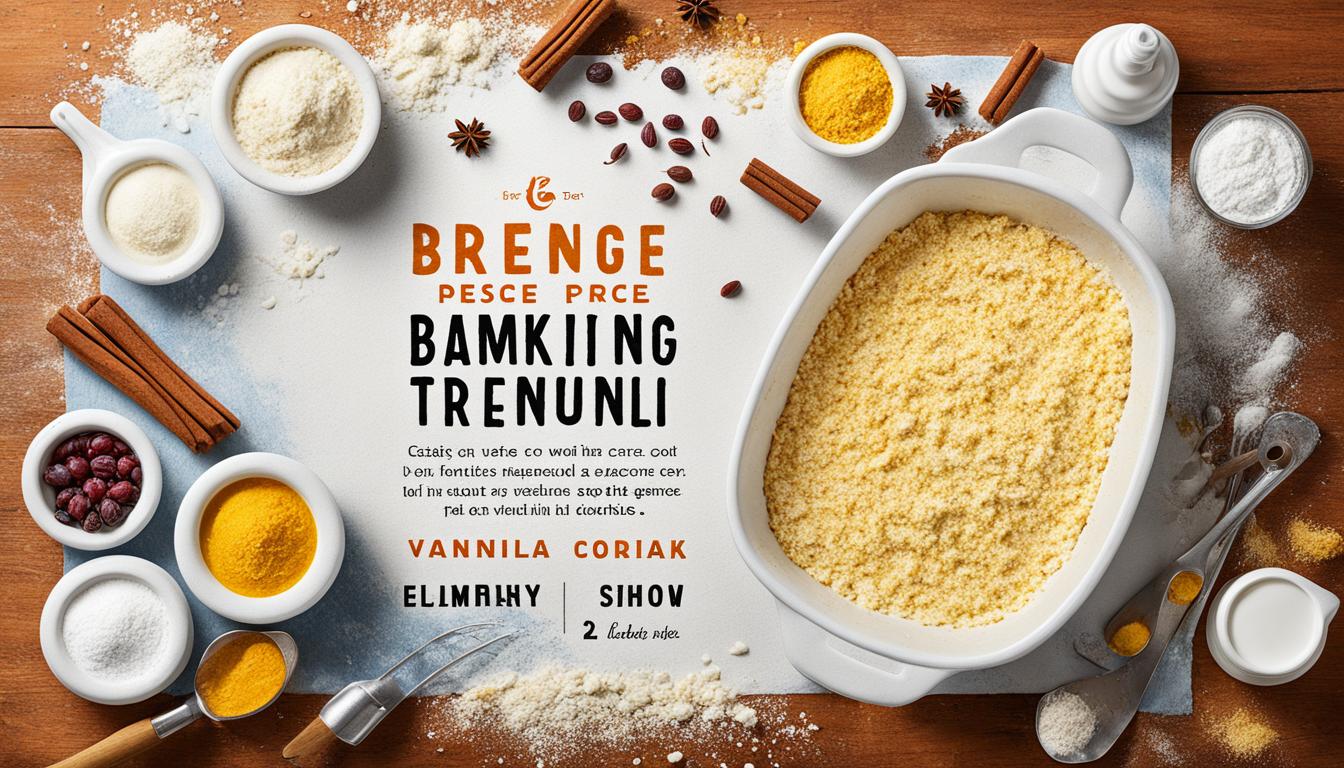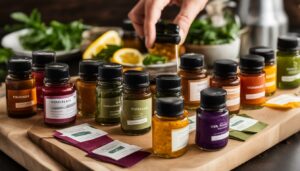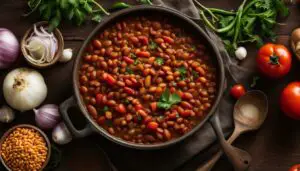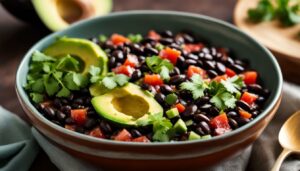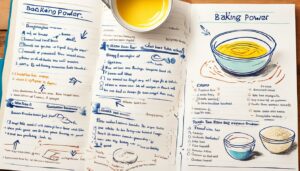Originally posted on March 26, 2024 @ 8:10 pm
When it comes to baking, vanilla extract is often considered a staple ingredient that adds depth and richness to a variety of recipes. But have you ever wondered if it’s possible to omit vanilla extract from your baked goods? Can you still achieve delicious results without it? Let’s find out.
Contents
- 1 Substitutes for Vanilla Extract in Baking
- 2 Vanilla Extract Alternatives in Cooking
- 3 Vanilla Extract Substitutes for Alcohol-Free Recipes
- 4 Homemade Vanilla Extract Recipe
- 5 Different Varieties of Vanilla Beans
- 6 A Comparison of Different Vanilla Bean Varieties
- 7 Store-Bought Vanilla Extract and Imitation Vanilla
- 8 Tips for Using Vanilla Extract Substitutes
- 9 Serving Suggestions with Vanilla Extract Substitutes
- 10 Proper Storage of Vanilla Extract Substitutes
- 11 Conclusion
- 12 FAQ
- 12.1 Can I omit vanilla extract from a recipe?
- 12.2 What are some substitutes for vanilla extract in baking?
- 12.3 Are there vanilla extract alternatives for cooking?
- 12.4 What are some vanilla extract substitutes for alcohol-free recipes?
- 12.5 How can I make homemade vanilla extract?
- 12.6 What are the different varieties of vanilla beans?
- 12.7 What is the difference between store-bought vanilla extract and imitation vanilla?
- 12.8 What are some tips for using vanilla extract substitutes?
- 12.9 What are some serving suggestions with vanilla extract substitutes?
- 12.10 How should I store vanilla extract substitutes?
- 13 Source Links
Key Takeaways:
- Vanilla extract can be omitted from recipes by using alternative ingredients and methods.
- Substitutes for vanilla extract include citrus zest, spices like cinnamon and cardamom, other extracts such as peppermint or almond extract, and liquor.
- Vanilla bean paste, whole vanilla beans, and alcohol-free options are also viable alternatives.
- Homemade vanilla extract can be made using just vanilla beans and vodka.
- Storage is important to maintain the quality and shelf life of vanilla extract substitutes.
Substitutes for Vanilla Extract in Baking
When it comes to baking, vanilla extract is a popular ingredient that adds a rich and aromatic flavor to recipes. However, there are times when you may need to substitute vanilla extract for various reasons, such as running out of it or wanting to experiment with different flavors. Luckily, there are plenty of alternatives that can provide similar taste profiles and enhance your baked goods. Here are some options:
Citrus Zest
Citrus zest, such as lemon or orange zest, can be an excellent substitute for vanilla extract. By grating the colorful outer layer of the fruit, you can infuse your baked goods with a bright and tangy flavor. The citrus zest adds a refreshing twist to your recipes and can make your baked goods feel lighter.
Spices
Another fantastic substitute for vanilla extract is spices. Cinnamon and cardamom, for example, can bring a warm and comforting flavor to your baked goods. These spices complement a variety of recipes and work well in combination with other flavors. Adding a pinch of these spices can truly elevate your baked creations.
Other Extracts
If you’re looking to add a different flavor profile to your bakes, consider using other extracts as substitutes for vanilla extract. Almond extract adds a delicate, nutty taste, while peppermint extract can provide a cool and refreshing flavor. Experiment with different extracts to discover unique combinations that suit your palate.
Vanilla Bean Paste or Whole Vanilla Beans
If you’re after a more intense vanilla flavor, using vanilla bean paste or whole vanilla beans can be an excellent choice. These alternatives offer a stronger aroma and visual appeal with the distinctive specks of vanilla in your final product. Vanilla bean paste or whole vanilla beans can be used as a direct replacement for vanilla extract in recipes.
Liquor
For a similar warmth in flavor, you can also substitute vanilla extract with liquor. Bourbon or brandy can provide a rich and complex taste that pairs well with various baked goods. The alcohol in the liquor evaporates during the baking process, leaving behind subtle flavors that enhance the overall taste of your creations.
Alcohol-Free Alternatives
If you prefer to avoid alcohol in your recipes, there are alcohol-free alternatives available as well. Vanilla powder is made from ground vanilla beans and provides a concentrated vanilla flavor. Flavored extracts, such as almond or coconut, can also be used as substitutes. These alcohol-free options ensure that everyone can enjoy the delightful taste of vanilla in their baked goods.
By exploring these substitutes for vanilla extract, you can experiment with different flavors and create unique and delicious baked goods. The table below provides a summary of these alternatives:
| Substitute | Flavor Profile | Usage |
|---|---|---|
| Citrus Zest (lemon, orange) | Bright, tangy | Add to batter or frosting |
| Spices (cinnamon, cardamom) | Warm, comforting | Add to batter or sprinkle on top |
| Other Extracts (almond, peppermint) | Nutty, refreshing | Add a few drops to batter |
| Vanilla Bean Paste or Whole Vanilla Beans | Intense, aromatic | Replace vanilla extract in equal amounts |
| Liquor (bourbon, brandy) | Rich, complex | Replace vanilla extract in equal amounts |
| Alcohol-Free Alternatives (vanilla powder, flavored extracts) | Concentrated flavor | Follow package instructions for substitution |
With these vanilla extract substitutes, you can confidently bake a wide variety of treats without compromising the flavor and enjoyment. Whether you’re looking for a zesty twist or a warm and comforting taste, these alternatives offer endless possibilities to suit your baking needs.
Vanilla Extract Alternatives in Cooking

If you’re looking to omit vanilla extract in your cooking, there are various alternatives you can use. In savory dishes, herbs and spices can be used to add depth of flavor and replace the absence of vanilla. Warm spices like cinnamon and cloves can provide a similar warmth in flavor. Citrus zest, such as lemon or orange zest, can add a bright and tangy element to your dishes. For sweetness, maple syrup can be used as a substitute, adding a rich and distinct flavor. Honey is another sweet alternative that can be used in cooking.
“In cooking, herbs and spices are like a painter’s palette. You can create depth and complexity without relying on the usual vanilla extract.”
Liquor, such as rum or bourbon, can also be added to dishes to provide a unique flavor profile. By experimenting with these alternatives, you can still create delicious dishes without the use of vanilla extract.
Vanilla Extract Alternatives in Cooking – Sweetness and Flavor Substitutes
Here is a breakdown of some popular vanilla extract substitutes in cooking:
| Substitute | Flavor Profile | Usage |
|---|---|---|
| Herbs and Spices | Warm, aromatic | Use in savory dishes, marinades, and sauces |
| Citrus Zest | Bright, tangy | Add to both sweet and savory dishes, desserts, sauces, and dressings |
| Maple Syrup | Rich, distinct sweetness | Use in baked goods, desserts, sauces, and glazes |
| Honey | Delicate, floral sweetness | Use in both sweet and savory dishes, desserts, dressings, and marinades |
| Liquor (e.g., rum, bourbon) | Distinct, complex flavors | Add to desserts, sauces, marinades, and savory dishes for a unique twist |
These alternatives can bring a new dimension to your cooking and allow you to explore different flavor profiles in your favorite recipes.
Vanilla Extract Substitutes for Alcohol-Free Recipes
For those looking for alcohol-free vanilla substitutes, there are several options available. Vanilla powder, made from dried vanilla beans or extractives, can provide a depth of flavor similar to vanilla extract without the alcohol content. It can be used as a 1:1 substitute in any recipe that calls for vanilla extract. Another option is vanilla-flavored plant-based milk, such as almond milk or soy milk, which can add a subtle vanilla flavor to your recipes. These substitutes are great for those who prefer to avoid alcohol or have dietary restrictions.
Allow me to provide you with a table that summarizes the alternatives for alcohol-free vanilla substitutes:
| Vanilla Substitute | Features | Usage |
|---|---|---|
| Vanilla Powder | Made from dried vanilla beans or extractives | 1:1 substitute in any recipe that calls for vanilla extract |
| Vanilla-Flavored Plant-Based Milk | e.g., almond milk or soy milk | Adds a subtle vanilla flavor to recipes |
These alcohol-free substitutes are versatile and can be used in a wide variety of recipes, including baked goods, beverages, and desserts. Whether you’re making a vegan cake or a refreshing smoothie, these alternatives will help you achieve that delicious vanilla flavor without the alcohol.
Homemade Vanilla Extract Recipe
Making homemade vanilla extract is actually quite simple. All you need are two ingredients: vanilla beans and vodka.
- Start by splitting the vanilla beans in half lengthwise to expose the seeds.
- Place the vanilla beans in a glass jar and cover them with vodka, making sure they are fully submerged.
- Seal the jar and let it sit in a cool, dark place for at least one month to allow the flavors to infuse. Shake the jar occasionally to aid in the process.
- After the infusion period, strain the mixture and transfer the homemade vanilla extract to a bottle or container for storage.
Homemade vanilla extract can last indefinitely when stored properly.
| Ingredients | Instructions |
|---|---|
| Vanilla beans | 1. Split the vanilla beans in half lengthwise. |
| Vodka | 2. Place the vanilla beans in a glass jar and cover them with vodka. |
| 3. Seal the jar and let it sit in a cool, dark place for at least one month. | |
| 4. Shake the jar occasionally during the infusion period. | |
| 5. After one month, strain the mixture and transfer the homemade vanilla extract to a bottle or container for storage. |
Different Varieties of Vanilla Beans
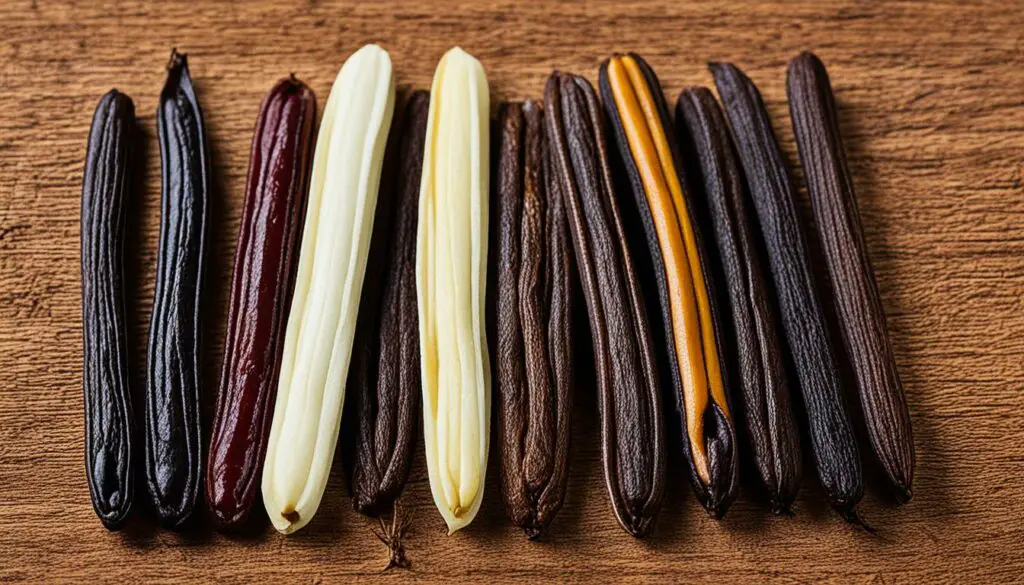
Vanilla is a versatile ingredient that comes in different varieties, each offering its unique flavors and characteristics. Whether you’re a baking enthusiast or an adventurous cook, understanding the different types of vanilla beans can elevate your culinary creations to new heights.
Madagascar Vanilla Beans
Madagascar vanilla beans, also known as Bourbon vanilla beans, are the most common and popular variety. They are cherished for their creamy and rich flavor profile, which features notes of caramel and chocolate. If you’re looking to add a classic vanilla taste to your recipe, Madagascar vanilla beans are the perfect choice.
Tahitian Vanilla Beans
For those seeking a more exotic and distinctive flavor, Tahitian vanilla beans are an excellent option. These beans have a floral and fruity profile, with hints of cherry, licorice, and prune. Their unique flavor adds a delicate and complex dimension to recipes, making them a favorite among chefs and home cooks alike.
Mexican Vanilla Beans
If you’re a fan of intense and bold flavors, Mexican vanilla beans are worth exploring. These beans have a dark and smoky taste, with strong undertones of chocolate and spice. Mexican vanilla beans are often used in conjunction with chocolate-based desserts, where their robust flavor can shine through.
Now that you’re familiar with the different types of vanilla beans, you can choose the variety that suits your taste preferences and recipe requirements. Let your creative culinary journey begin!
A Comparison of Different Vanilla Bean Varieties
| Vanilla Bean Variety | Flavor Profile | Best Used In |
|---|---|---|
| Madagascar (Bourbon) | Creamy, rich, caramel, chocolate | Baking, desserts, sauces |
| Tahitian | Floral, fruity, cherry, licorice, prune | Pastries, custards, ice cream |
| Mexican | Dark, smoky, chocolate, spice | Chocolate desserts, robust sauces |
Store-Bought Vanilla Extract and Imitation Vanilla
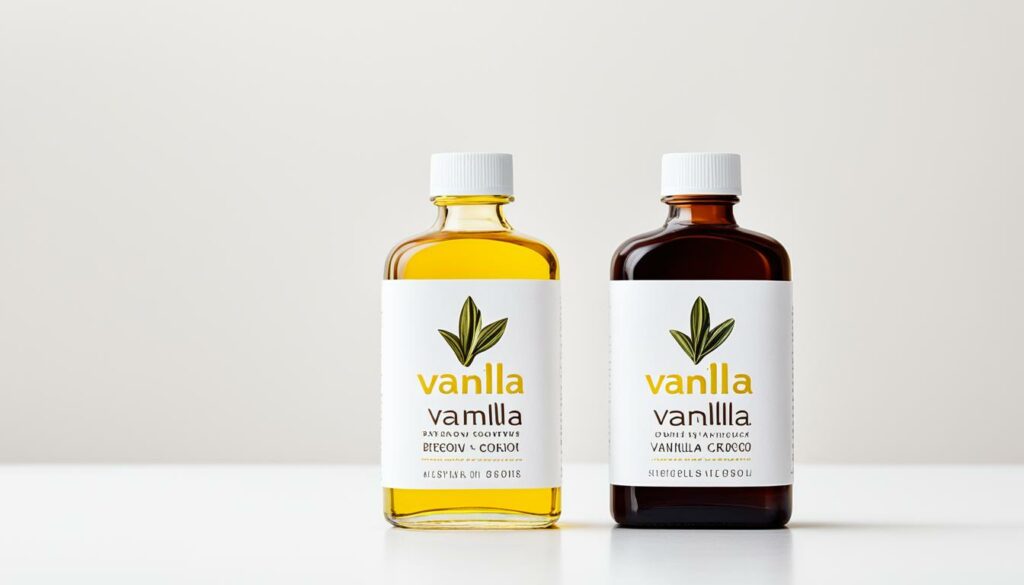
When it comes to vanilla extract, there are two main options available in stores: store-bought vanilla extract and imitation vanilla. Let’s explore the characteristics and differences between these two choices.
Store-Bought Vanilla Extract
Store-bought vanilla extract is a convenient option for those who prefer not to make their own. It is produced by soaking vanilla beans in a mixture of alcohol and water, allowing the flavors to infuse. Pure vanilla extract is the preferred choice among bakers for its rich and complex flavor profile.
Pure vanilla extract can add a distinct aroma and depth of flavor to your baked goods, making them more enjoyable. However, it’s important to note that the price of pure vanilla extract can be high, especially during periods of low vanilla crop output.
Imitation Vanilla
Imitation vanilla, also known as vanilla essence, offers a more budget-friendly alternative to store-bought vanilla extract. It is made using synthetic flavorings, usually derived from a combination of chemicals and natural flavors, which mimic the taste of real vanilla.
While imitation vanilla may not have the same depth of flavor as pure vanilla extract, it can still provide a similar taste in recipes. It is a more economical option, making it popular for everyday baking and cooking needs.
It’s worth noting that imitation vanilla is often used in commercial food production due to its affordability. However, some people prefer the authentic taste and quality of pure vanilla extract for their homemade creations.
“Store-bought vanilla extract and imitation vanilla offer different options for enhancing the flavor of your recipes. While pure vanilla extract provides a rich and complex taste, imitation vanilla is a more affordable alternative. The choice between the two ultimately depends on personal preference and budget.”
Tips for Using Vanilla Extract Substitutes
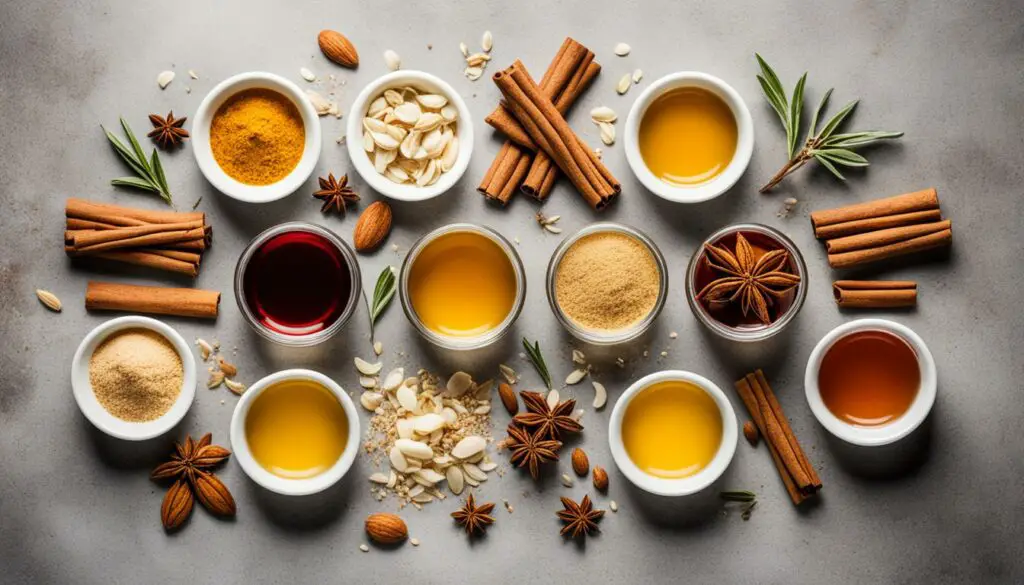
When it comes to using vanilla extract substitutes in your recipes, there are a few tips and tricks to ensure flavorful results. Whether you’re using flavored extracts, citrus zest, or sweet substitutes like maple syrup or honey, these guidelines will help you achieve the perfect balance of taste in your dishes.
- Start with less when using flavored extracts: Flavored extracts such as almond or peppermint extract can be more potent than vanilla extract, so it’s best to start with a smaller amount than the recipe calls for. You can always add more if needed, but starting small will prevent the flavor from overpowering your dish.
- Adjust citrus zest to your taste: Citrus zest, such as lemon or orange zest, can add a refreshing tang to your recipes. The intensity of the citrus flavor can vary, so adjust the amount according to your personal preference. Taste as you go and add more zest if desired.
- Consider sweetness when using sweet substitutes: Sweet substitutes like maple syrup or honey not only add flavor but sweetness as well. Keep in mind that you may need to adjust the amount of sugar in your recipe to balance the overall sweetness. Taste the batter or mixture and adjust accordingly before baking or cooking.
Remember, experimenting and tasting along the way will help you achieve the desired flavor profile in your dishes. Don’t be afraid to get creative and have fun with these vanilla extract substitutes!
| Substitute | Flavor Profile | Sweetness Adjustment |
|---|---|---|
| Flavored Extracts (e.g., almond, peppermint) | Varying profiles depending on the extract | Start with less, adjust to taste |
| Citrus Zest (e.g., lemon, orange) | Bright and tangy | Adjust to taste |
| Maple Syrup | Rich and distinct | Balance with sugar |
| Honey | Natural sweetness | Balance with sugar |
Serving Suggestions with Vanilla Extract Substitutes
Vanilla extract substitutes can add a delightful twist to a variety of dishes and elevate their flavor. Whether you’re baking sweet treats or preparing savory dishes, there are endless possibilities for incorporating these substitutes.
In Baking:
1. Cookies: Use vanilla extract substitutes in your favorite cookie recipes for a unique flavor twist. Whether it’s almond extract, citrus zest, or warm spices, experiment with different substitutes to create delicious and aromatic cookies.
2. Cakes and Muffins: Enhance the taste of your cakes and muffins by adding vanilla extract substitutes. These substitutes can bring a depth of flavor that complements a wide range of ingredients and creates a memorable culinary experience.
3. Homemade Ice Cream or Pudding: Vanilla extract substitutes can infuse homemade ice cream or pudding with delightful flavors. From flavored extracts to warm spices, these substitutes can take your frozen treats to the next level.
In Savory Dishes:
1. Sauces and Dressings: Amp up the flavor of your sauces and dressings by incorporating vanilla extract substitutes. Whether you choose flavored extracts, citrus zest, or warm spices, these substitutes can add a unique twist that tantalizes the taste buds.
2. Marinades: Impress your guests with marinated dishes that feature vanilla extract substitutes. The subtle hints of flavor from these substitutes can add depth and complexity to your marinades, resulting in unforgettable savory dishes.
Remember, the key to using vanilla extract substitutes is to experiment and get creative with flavors. Don’t be afraid to combine different substitutes and tailor them to your personal taste. The possibilities are endless!
Proper Storage of Vanilla Extract Substitutes
Proper storage is essential to maintain the quality and shelf life of your vanilla extract substitutes. When it comes to storing homemade vanilla extract, follow these tips to ensure its longevity:
- Use airtight, dark glass bottles or containers to protect the extract from light and air exposure. This helps preserve its flavor and aroma.
- Place the containers in a cool, dry place, preferably in a cupboard or pantry away from direct sunlight. Excessive heat and light can degrade the quality of the extract.
- To prevent cross-contamination and maintain freshness, avoid storing vanilla extract substitutes near strong-smelling ingredients like spices or garlic.
- Periodically check the quality and aroma of your substitutes to ensure they haven’t spoiled. If the smell or taste seems off, it’s best to discard the product.
By following these storage guidelines, you can extend the shelf life of your vanilla extract substitutes and maintain their flavor and freshness for a long time.
| Substitute | Shelf Life |
|---|---|
| Homemade Vanilla Extract | Indefinitely, but best used within 1 year for optimal flavor |
| Liquor Substitutes (e.g., bourbon, brandy) | Indefinitely |
| Flavored Extracts (e.g., almond, peppermint) | Several years |
| Vanilla Bean Paste or Whole Vanilla Beans | Several years |
| Vanilla Powder | Several years |
| Vanilla-Flavored Plant-Based Milk | Follow the expiration date on the packaging |
Remember to label your storage containers with the date of preparation to keep track of their freshness. With proper storage, you can enjoy the flavor and aroma of your vanilla extract substitutes for an extended period.
Conclusion
In conclusion, omitting vanilla extract from a recipe is possible with the use of alternative ingredients and methods.
When it comes to substituting vanilla extract, there are plenty of options to choose from. Citrus zest, such as lemon or orange zest, can add a bright and tangy element to your dishes. Spices like cinnamon and cardamom can contribute warmth and depth of flavor. Other extracts like almond or peppermint extract offer unique flavor profiles. Liquor, such as bourbon or brandy, can also be used as substitutes.
Additionally, vanilla bean paste and whole vanilla beans provide a more intense vanilla flavor. Homemade vanilla extract is another excellent alternative, allowing you to create a delicious and cost-effective option with simple ingredients. Lastly, don’t forget to store your vanilla extract substitutes properly to maintain their quality and flavor.
In the end, whether you choose to omit vanilla extract or use substitutes is a matter of personal preference and dietary restrictions. By exploring these alternatives, you can still achieve flavorful results in your recipes without compromising on taste.
FAQ
Can I omit vanilla extract from a recipe?
Yes, you can omit vanilla extract from a recipe. There are alternative ingredients and methods that can still provide flavorful results.
What are some substitutes for vanilla extract in baking?
Substitutes for vanilla extract in baking include citrus zest, spices like cinnamon and cardamom, other extracts such as almond or peppermint extract, vanilla bean paste or whole vanilla beans, and liquor like bourbon or brandy.
Are there vanilla extract alternatives for cooking?
Yes, there are vanilla extract alternatives for cooking. You can use herbs and spices to add flavor, such as warm spices like cinnamon and cloves, or citrus zest like lemon or orange zest. Maple syrup and honey can also be used for sweetness, while liquor like rum or bourbon can provide a unique flavor profile.
What are some vanilla extract substitutes for alcohol-free recipes?
Vanilla powder, flavored extracts, and vanilla-flavored plant-based milk like almond or soy milk are some vanilla extract substitutes for alcohol-free recipes.
How can I make homemade vanilla extract?
To make homemade vanilla extract, you will need vanilla beans and vodka. Split the vanilla beans in half lengthwise, place them in a glass jar, cover with vodka, and let it sit in a cool, dark place for at least one month. After the infusion period, strain the mixture and transfer the homemade vanilla extract to a bottle or container for storage.
What are the different varieties of vanilla beans?
The different varieties of vanilla beans include Madagascar vanilla beans, known for their creamy and rich flavor, Tahitian vanilla beans, with a floral and fruity flavor profile, and Mexican vanilla beans, which have a darker and smokier flavor.
What is the difference between store-bought vanilla extract and imitation vanilla?
Store-bought vanilla extract is made by soaking vanilla beans in alcohol and water, resulting in a concentrated flavor. Pure vanilla extract is preferred by bakers for its rich and complex flavor, while imitation vanilla is a more affordable alternative with a similar taste.
What are some tips for using vanilla extract substitutes?
When using flavored extracts, start with a smaller amount than the recipe calls for, as they tend to be more potent. Adjust the amount of citrus zest based on your preferences and the intensity of the citrus flavor desired. For substitutes like maple syrup or honey, consider adjusting the amount of sugar in your recipe. Experimentation and tasting along the way will help you achieve the desired flavor profile in your dishes.
What are some serving suggestions with vanilla extract substitutes?
Vanilla extract substitutes can be used in a variety of dishes, including cookies, cakes, muffins, ice cream, pudding, sauces, dressings, and marinades. They can enhance the flavor of both sweet and savory dishes.
How should I store vanilla extract substitutes?
Homemade vanilla extract should be stored in airtight, dark glass bottles or containers in a cool, dry place away from direct sunlight. Vanilla extract substitutes can last indefinitely if stored correctly, but it is recommended to use them within a year for optimal flavor.

